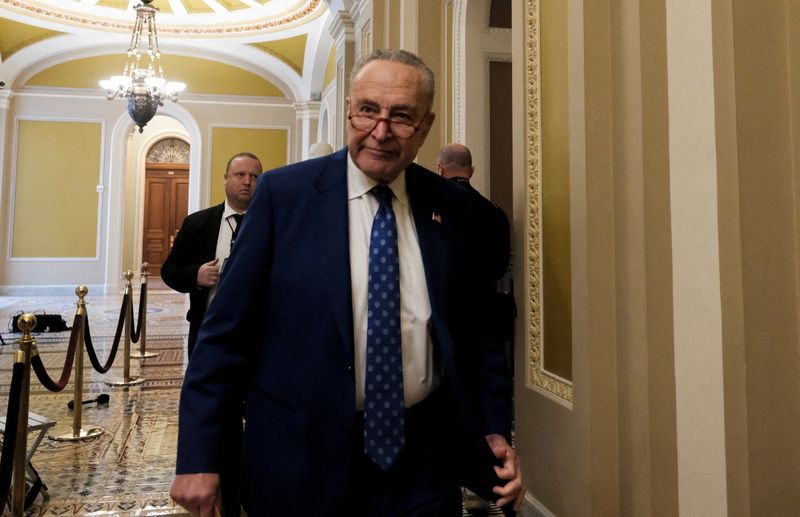U.S. Senate passes stopgap funding bill to avert government shutdown
2022.12.15 23:42
[ad_1]

© Reuters. FILE PHOTO: U.S. Senate Majority Leader Chuck Schumer walks at the U.S. Capitol building in Washington, U.S., November 15, 2022. REUTERS/Michael Mccoy
By Makini Brice and Richard Cowan
WASHINGTON (Reuters) – The U.S. Senate passed by a 71-19 vote a weeklong stopgap funding bill on Thursday to avoid a partial government shutdown ahead of a midnight Friday deadline, sending the House-passed bill to President Joe Biden to sign it into law.
Next up is a sweeping measure expected to tally around $1.7 trillion that will keep federal agencies operating through the fiscal year ending Sept. 30, 2023.
“This is about taking a very simple, exceedingly responsible step to ensure we finish the year without hiccups and with minimal drama. A one-week CR will give us more time so we can keep working,” Senate Majority Leader Chuck Schumer said just before passage of the temporary funding bill.
Congressional negotiators announced earlier this week a framework for the full-year “omnibus” package, but did not provide details on the amount they had agreed on or specific program funding to be included.
However, it is expected to include aid for Ukraine’s fight against Russian forces and to reform the way Congress certifies U.S. presidential elections.
Senator Richard Shelby, the top Republican on the chamber’s Appropriations Committee, said the total amount of funding was being divided among 12 appropriations subcommittees. It will take four or five days for staffers to fill in details for all of the line items, he estimated.
Congress now has a Dec. 23 deadline to either pass this omnibus bill being written by Senate staffers or approve yet another temporary-funding bill – which would leave a contentious debate over budget priorities hanging over the new Congress convening on Jan. 3.
By then, Republicans will have taken control of the House of Representatives from Democrats, who will retain control of the Senate.
While top Senate Republicans signed onto the omnibus funding framework, House Republicans have rejected it, wanting negotiations delayed until after they assume the House majority so they would have more leverage to cut non-defense spending.
The last time Democrats and Republicans allowed government funding to lapse, a record-long, 35-day partial shutdown ensued, spanning from Dec. 22, 2018, until Jan. 25, 2019.
The main stumbling block was over then-President Donald Trump’s demand for large new investments in a U.S.-Mexico border wall that many saw as ineffective and wasteful.
[ad_2]
Source link








